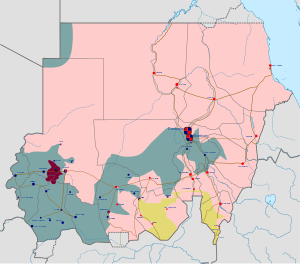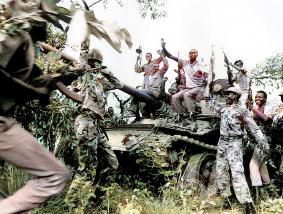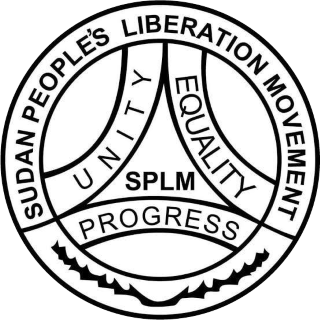This is a list of engagements during the 2023 war in Sudan.
Contents

This is a list of engagements during the 2023 war in Sudan.

| Name | Location | Start date | End date | Result of the battle |
|---|---|---|---|---|
| Battle of Khartoum | Khartoum | 15 April 2023 | Ongoing | |
| Darfur campaign | Darfur States | 15 April 2023 | Ongoing | |
| Battle of Geneina | Geneina | 15 April 2023 | 22 June 2023 | RSF victory |
| Battle of Merowe | Merowe | 15 April 2023 | 21 April 2023 | SAF victory |
| Battle of Nyala | Nyala | 15 April 2023 | 26 October 2023 | RSF victory |
| Battle of El Fasher | El Fasher | 15 April 2023 | Ongoing | |
| Siege of El Obeid | El-Obeid | 15 April 2023 | 1 September 2023 | SAF victory |
| Siege of Zalingei | Zalingei | 15 April 2023 | 6 August 2023 | RSF victory |
| Battle of Kadugli | Kadugli | 8 June 2023 | Ongoing | |
| Battle of Kabkabiya | Kabkabiya | 15 April 2023 | 23 April 2023 | RSF victory |
| Battle of Kutum | Kutum | 30 May 2023 | 4 June 2023 | RSF victory [1] |
| Battle of Wad Madani | Wad Madani | 15 December 2023 | 19 December 2023 | RSF victory |
| Siege of Babanusa | Babanusa, West Kordofan | 22 January 2024 | 5 February 2024 | SAF victory |
| Name | Location | Start date | Perpetrator | Deaths |
|---|---|---|---|---|
| Masalit massacres | Darfur | 15 April 2023 | RSF | ~20,000 |
| Misterei massacre | Misterei, West Darfur | 27 May 2023 | RSF | 97 |
| Ardamata massacre | Ardamata, West Darfur | 8 November 2023 | RSF | 2000 |
| Tawila massacre | Tawila, North Darfur | 19 June 2023 | RSF | |
| Sirba massacre | Sirba, West Darfur | July 2023 | RSF | Hundreds |
| Kutum massacre | Kutum, North Darfur | 30 May 2023 | RSF | ~75 |

Khartoum or Khartum is the capital of Sudan. With a population of 6,344,348, Khartoum's metropolitan area is the largest in Sudan.

Sudan, officially the Republic of the Sudan, is a country in Northeast Africa. It borders the Central African Republic to the southwest, Chad to the west, Egypt to the north, Eritrea to the northeast, Ethiopia to the southeast, Libya to the northwest, South Sudan to the south, and the Red Sea. It has a population of 45.7 million people as of 2022 and occupies 1,886,068 square kilometres, making it Africa's third-largest country by area and the third-largest by area in the Arab League. It was the largest country by area in Africa and the Arab League until the secession of South Sudan in 2011; since then both titles have been held by Algeria. Its capital and most populous city is Khartoum.

The history of Sudan refers to the territory that today makes up Republic of the Sudan and the state of South Sudan, which became independent in 2011. The territory of Sudan is geographically part of a larger African region, also known by the term "Sudan". The term is derived from Arabic: بلاد السودان bilād as-sūdān, or "land of the black people", and has sometimes been used more widely referring to the Sahel belt of West and Central Africa.

The Sudanese Armed Forces are the military forces of the Republic of the Sudan. In 2011, IISS estimated the forces' numbers at 109,300 personnel. The CIA estimates that the SAF may have up to 200,000 personnel.

The foreign relations of Sudan are generally in line with the Muslim Arab world, but are also based on Sudan's economic ties with the People's Republic of China and Russia.

Port Sudan is a city and port on the Red Sea in eastern Sudan, and the capital of Red Sea State. Port Sudan is Sudan's main seaport and the source of 90% of the country's international trade. The population of Port Sudan was estimated in the 2008 Census of Sudan to be 394,561 people.

Omar Hassan Ahmad al-Bashir is a Sudanese former military officer and politician who served as Sudan's head of state under various titles from 1989 until 2019, when he was deposed in a coup d'état. He was subsequently incarcerated, tried and convicted on multiple corruption charges. He came to power in 1989 when, as a brigadier general in the Sudanese Army, he led a group of officers in a military coup that ousted the democratically elected government of prime minister Sadiq al-Mahdi after it began negotiations with rebels in the south; he subsequently replaced President Ahmed al-Mirghani as head of state. He was elected three times as president in elections that have been under scrutiny for electoral fraud. In 1992, al-Bashir founded the National Congress Party, which remained the dominant political party in the country until 2019. In March 2009, al-Bashir became the first sitting head of state to be indicted by the International Criminal Court (ICC), for allegedly directing a campaign of mass killing, rape, and pillage against civilians in Darfur. On 11 February 2020, the Government of Sudan announced that it had agreed to hand over al-Bashir to the ICC for trial.
The Janjaweed are an Arab nomad militia group from the Sahel region that operates in Sudan, particularly in Darfur, and eastern Chad. They have also been speculated to be active in Yemen. According to the United Nations definition, Janjaweed membership consists of Arab nomad tribes from the Sahel, the core of whom are from the Abbala Arabs, traditionally employed in camel herding, with significant recruitment from the Baggara.

The Sudan national football team represents Sudan in international football and is controlled by the Sudan Football Association, the governing body for football in Sudan. Its home ground is Khartoum Stadium in the capital Khartoum. In 1957, it was one of the three teams to participate in the inaugural Africa Cup of Nations, the other two being Egypt and Ethiopia.

The Second Sudanese Civil War was a conflict from 1983 to 2005 between the central Sudanese government and the Sudan People's Liberation Army. It was largely a continuation of the First Sudanese Civil War of 1955 to 1972. Although it originated in southern Sudan, the civil war spread to the Nuba mountains and the Blue Nile. It lasted for almost 22 years and is one of the longest civil wars on record. The war resulted in the independence of South Sudan 6 years after the war ended.

Juba is the capital and largest city of South Sudan. The city is situated on the White Nile and also serves as the capital of the Central Equatoria State. It is the most recently declared national capital and had a population of 525,953 in 2017. It has an area of 52 km2 (20 sq mi), with the metropolitan area covering 336 km2 (130 sq mi).

Salva Kiir Mayardit, also known as Salva Kiir, is a South Sudanese politician who has been the President of South Sudan since its independence on 9 July 2011. Prior to independence, he was the President of the Government of Southern Sudan, as well as First Vice President of Sudan, from 2005 to 2011. He was named Commander-in-Chief of the Sudan People's Liberation Army (SPLA) in 2005, following the death of John Garang.

The Sudan People's Liberation Movement is a political party in South Sudan. It was initially founded as the political wing of the Sudan People's Liberation Army in 1983. On January 9, 2005 the SPLA, the SPLM and the Government of Sudan signed the Comprehensive Peace Agreement, ending the civil war. SPLM then obtained representation in the Government of Sudan, and was the main constituent of the Government of the then semi-autonomous Southern Sudan. When South Sudan became a sovereign state on 9 July 2011, SPLM became the ruling party of the new republic. SPLM branches in Sudan separated themselves from SPLM, forming the Sudan People's Liberation Movement–North. Further factionalism appeared as a result of the 2013–2014 South Sudanese Civil War, with President Salva Kiir leading the SPLM-Juba and former Vice President Riek Machar leading the Sudan People's Liberation Movement-in-Opposition.

The War in Darfur, also nicknamed the Land Cruiser War, was a major armed conflict in the Darfur region of Sudan that began in February 2003 when the Sudan Liberation Movement (SLM) and the Justice and Equality Movement (JEM) rebel groups began fighting against the government of Sudan, which they accused of oppressing Darfur's non-Arab population. The government responded to attacks by carrying out a campaign of ethnic cleansing against Darfur's non-Arabs. This resulted in the death of hundreds of thousands of civilians and the indictment of Sudan's president, Omar al-Bashir, for genocide, war crimes, and crimes against humanity by the International Criminal Court.

A referendum took place in Southern Sudan from 9 to 15 January 2011, on whether the region should remain a part of Sudan or become independent. The referendum was one of the consequences of the 2005 Naivasha Agreement between the Khartoum central government and the Sudan People's Liberation Army/Movement (SPLA/M).

South Sudan, officially the Republic of South Sudan, is a landlocked country in eastern Central Africa. It is bordered by Ethiopia, Sudan, the Central African Republic, the Democratic Republic of the Congo, Uganda, and Kenya, and includes the vast swamp region of the Sudd, formed by the White Nile and known locally as the Bahr al Jabal, meaning "Mountain Sea". The population was 11,088,796 in 2023, and Juba is the capital and largest city. South Sudan gained independence from Sudan on 9 July 2011, making it the most recent sovereign state or country with widespread recognition as of 2024.

The Rapid Support Forces is a paramilitary force formerly operated by the Government of Sudan. The RSF grew out of, and is primarily composed of, the Janjaweed militias which previously fought on behalf of the Sudanese government. Its actions in Darfur qualify as crimes against humanity in the opinion of Human Rights Watch.

Abdel Fattah al-Burhan Abdelrahman al-Burhan is a Sudanese army general who is the de facto ruler of Sudan. Following the Sudanese Revolution in April 2019, he was handed control of the military junta, the Transitional Military Council, a day after it was formed, due to protesters' dissatisfaction with the establishment ties of initial leader Ahmed Awad Ibn Auf. He served as chairman of the TMC until a draft constitutional declaration signed with civilians went into effect on the 17th of August and a collective head of state Transitional Sovereignty Council was formed, also to be initially headed by al-Burhan.

Mohamed Hamdan Dagalo, generally referred to mononymously as Hemedti, Hemetti, Hemeti, or Hemitte, is a Janjaweed leader from the Rizeigat tribe in Darfur, who was the Deputy head of the Transitional Military Council (TMC) following the 2019 Sudanese coup d'état. Since 2013, Hemetti has commanded the Rapid Support Forces (RSF). He was considered by The Economist to be the most powerful person in Sudan as of early July 2019.